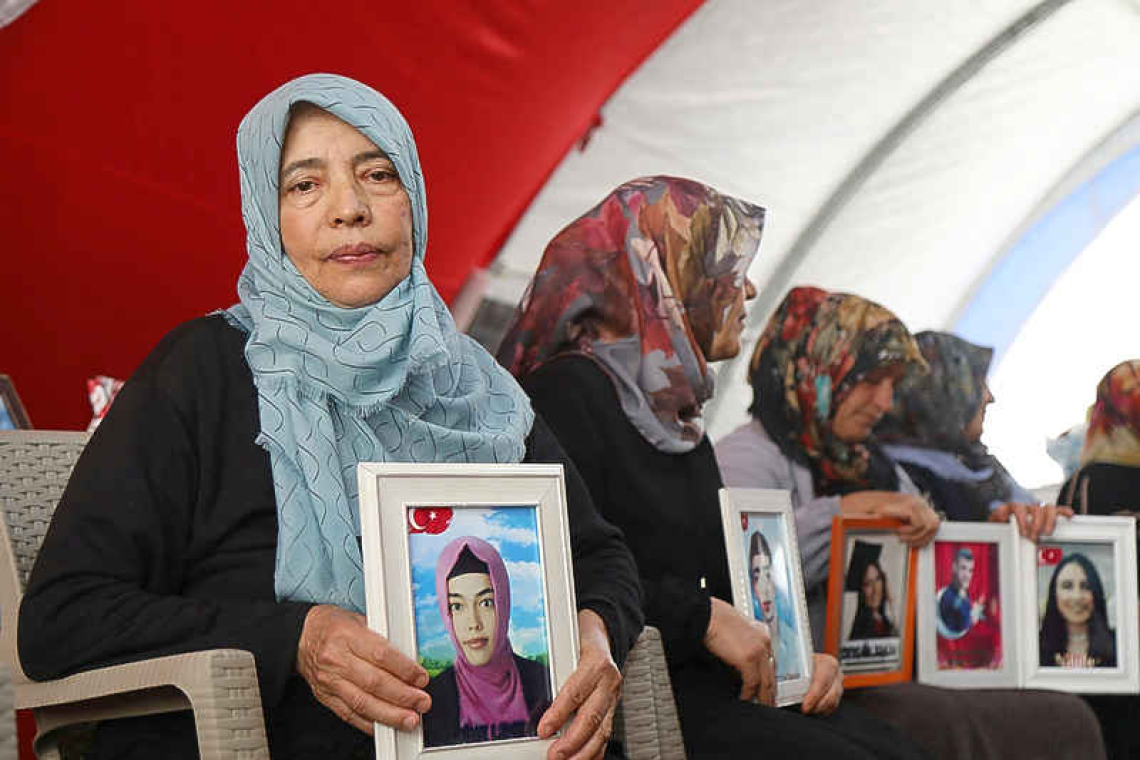Hatice Levent holds a picture of her daughter Fadime who is believed to have joined the outlawed Kurdistan Workers' Party (PKK) as families of young people who they say were recruited by the PKK gather outside the local office of the pro-Kurdish DEM Party, as PKK disbands and ends 40-year Turkey insurgency, in the southeastern city of Diyarbakir, Turkey, on Monday.
ISTANBUL/ANKARA--The Kurdistan Workers Party (PKK) militant group, which has been locked in bloody conflict with Turkey for more than four decades, has decided to disband and end its armed struggle, group members and Turkish leaders said on Monday.
Since the PKK launched its insurgency in 1984 - originally with the aim of creating an independent Kurdish state - the conflict has killed more than 40,000 people, exerted a huge economic burden and fuelled social tensions.
The PKK's decision, at a congress last week, could boost NATO member Turkey's political and economic stability and encourage moves to ease tensions in neighbouring Iraq and Syria, where Kurdish forces are allied with U.S. forces. Speaking after a cabinet meeting in Ankara, President Tayyip Erdogan said the decision was an important step, and labeled the move an "important threshold" towards Ankara's goal of a terrorism-free country.
"With terror and violence being completely disengaged, the doors of a new era in every area, namely strengthening politics and democratic capacity, will be opened," he said. "The winners will be our people and country, and actually all our siblings in our region," he added."Our intelligence agency and other authorities will follow the upcoming process closely to avoid any road accidents and to ensure the promises made are kept."
The group's dramatic announcement comes as Erdogan seeks to capitalise on what he sees as the vulnerabilities of affiliated Kurdish forces in Syria after the fall of former President Bashar al-Assad to Turkey-backed rebels in December.It also comes amid the group's increasingly weakened position in northern Iraq, where it is based, after having been pushed out of Turkey and well beyond its borders.
While Ankara welcomed the decision to dissolve, it does not guarantee peace. Rather it paves the way for agreeing a tricky legal framework for securely disarming the PKK, which is designated a terrorist group by Turkey and its Western allies.
"The PKK 12th Congress decided to dissolve the PKK's organizational structure... and end the armed struggle," Firat news agency reported it saying as it closed a congress.
A PKK official confirmed the decision and said all military operations would cease "immediately", adding weapon handovers were contingent on Ankara's response and approach to Kurdish rights, and the fate of PKK fighters and leaders. Kurds make up some 20% of Turkey's 86 million population.
The PKK held the congress in response to a February call to disband from its jailed leader Abdullah Ocalan, who has been imprisoned on an island south of Istanbul since 1999. It said on Monday that he would manage the process.
However, it was not clear whether Ankara agreed to Ocalan's continued role, which polls suggest could be unpopular among Turks. Nor were details available on how the disarmament and breakup of the PKK would happen in practice.
Turkish Foreign Minister Hakan Fidan said the PKK decision was of "historic importance" and could bring "lasting peace and stability" for all peoples of the region. "There are practical steps that will be taken and we will follow those closely," he told a press conference alongside the Syrian and Jordanian foreign ministers in Ankara on Monday.







